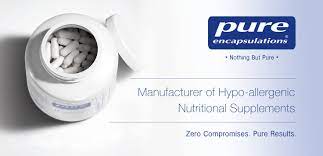
Pure Encapsulations Supplements
Several researches show that people who take Pure Encapsulations supplements or multivitamins experience a positive health impact. Among the many benefits of taking vitamins, they may also promote a sense of well-being. In this article, you will learn the benefits of calcium, vitamin D, and vitamin B12.
The ingredients of Pure Encapsulations are generally safe for use. Their products are sourced from several trusted suppliers. Each ingredient is tested for heavy metals, microbial contaminants, and allergens. They do not use unnecessary fillers or additives. Moreover, Pure Encapsulations claims to make their supplements free of most allergens. Additionally, their ingredients are listed on the label. However, people should still read the labels and seek advice from a health practitioner before taking supplements.
Since Pure Encapsulations are made in an FDA-inspected and certified facility, their prices are not too high. This makes them an affordable option for those with limited funds. However, it is important to keep in mind that Pure Encapsulations supplements online are not cheap – you can get the same quality for a lower price by buying them from a practitioner. Purchasing them from a practitioner is also a good way to ensure you are getting high-quality products, but there are also many risks associated with doing so.
Since its inception, Pure Encapsulations has stood for high-quality, tested micronutrients. They make their formulas specifically for their customers to achieve maximum tolerability and purity. What’s more, their supplements contain no unnecessary additives. Unlike most other supplement companies, Pure Encapsulations supplements are backed by scientific research and do not contain any additives. The company is also committed to providing a clean label that lists each and every ingredient, so customers can be sure of what they’re getting.
Taking multivitamins
Before starting a multivitamin or supplement program, you should understand how to choose the right one for you. A multivitamin provides you with different vitamins and minerals that your body needs for proper growth and functioning. It may also contain herbs, fatty acids, and amino acids. Since dietary supplements are not regulated by the Food and Drug Administration as strictly as prescription drugs, they can contain higher levels of certain nutrients than what is stated on the label. Also, dietary supplements may contain ingredients that interact with your medications.
There is a lot of evidence to support the benefits of multivitamins for men. A large study of nearly 6,000 male physicians over the age of 65 found that there was a big difference in cognitive performance between men who took multivitamins and those who didn’t. Women who took multivitamins experienced better health, and the same was true for men. So while multivitamins are not a bad idea, they can’t replace healthy habits.
Taking calcium
Taking calcium is important for bone health. It keeps bones and teeth strong, but calcium also has a wide range of benefits for the body. While calcium from the diet is the most important source, supplements can be helpful if the diet falls short. Learn what your calcium needs are, the pros and cons of calcium supplements, and how to choose a suitable one. Calcium is important for healthy bones and teeth, and you should supplement your diet with calcium to achieve these benefits.
The amount of calcium in calcium supplements varies from brand to brand. Calcium carbonate is more absorbable and requires little or no stomach acid. Calcium citrate, on the other hand, is easily absorbed when taken on an empty stomach, and won’t cause constipation. However, it does have a lower calcium content per pill. It may be wise to choose a calcium supplement based on the label’s ingredients.
Taking vitamin D
Many people don’t realize how much vitamin D they need. However, it’s critical to have adequate amounts of vitamin D in order to maintain a healthy bone density. Luckily, there are many ways to get this essential nutrient. Food sources include foods and adequate sun exposure. However, vitamin D supplements are not a substitute for sunlight. In fact, your levels of vitamin D will likely increase without you even knowing it.
When you visit your healthcare provider, they’ll check your blood levels of the storage form of vitamin D, calcifediol. Low levels are considered deficient, while high levels are adequate. The U.S. National Academy of Medicine recommends that people take at least 4,000 IU of vitamin D daily. For example, if you are over age 60, you should consider taking a vitamin D supplement.
Taking vitamin B12
Taking vitamin B12 supplements can help your body absorb more of the essential nutrient. The human body can store years’ worth of this essential vitamin in the liver. When you do not use your liver to absorb vitamin B12, you can develop a deficiency. Pernicious anemia and HIV infection are also common reasons for vitamin B12 deficiency. While vitamin B12 is generally safe to take, it is not known whether it can cause side effects. Therefore, you should discuss the matter with a qualified healthcare provider.
It is important to note that vitamin B12 supplements have been shown to cause some adverse side effects. For example, if you take a vitamin B12 supplement, it should contain 10mcg of the nutrient. While this is more than the recommended daily allowance, your body is not able to absorb it at the same rate. So, if you notice gastrointestinal discomfort or difficulty sleeping, it may be time to reduce your dosage.

